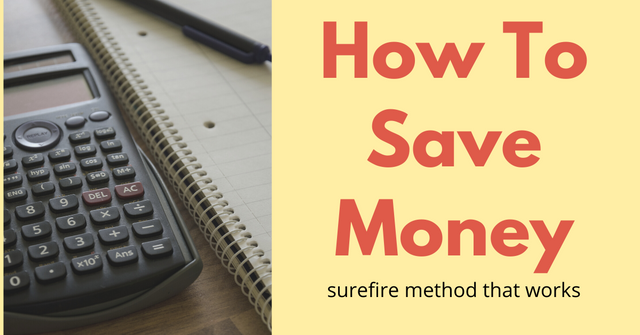How to save money (a surefire method)

You work hard, day and night. You just don’t understand how others do it. How can you save money each month or every day even if you're on a low income?
Well, it’s really simple when it becomes a habit. Anyway, let's show you how.
Whether you're a parent, teenager, or student, you can have enough to live off and stash away.
But hey, you may feel it's quite easy to save, however, research has shown that 1 in every American has no savings.
Therefore, saving has to be developed as a culture.
Here are some simple ways to save money for the future.
Set Saving Goals
Your ability to go through with your savings plan begins with knowing why you’re saving.
Is it to buy a house, get married, save for college, or go on a vacation? You decide.
Once you've figured out why you're saving and for how long, it'll help you achieve your goal.
Set a Budget
It is important to determine how much you have and how much you can afford to spend.
This can be achieved by using the 50, 20, 30 budget rule. This will help you spend more on useful things, leaving out those things which are not necessary.
The 50, 20, 30 budget rule states that 50% of your income should be spent on food and rent.
20% saved, and 30% can be spent on personal expenses.
On your next income, use this rule.
Put Your Savings On Autopilot
It may be challenging to make a manual transfer of funds to your savings account once you get that paycheck.
However, it's quite easy to save when funds are automatically deposited into your savings account.
This means you won't miss out on your monthly savings each time you're paid.
And most importantly, you won't be tempted to spend it or procrastinate.
Why not ask your bank how this works. Most banks have got services that aids automatic savings.
Use the 30 Day Rule
So, what’s the 30-day rule?
The 30-day rule states that if you have plans to make a major purchase, give it some thought first.
Thereafter, note down what it is alongside how much it will cost.
And if you still feel it’s necessary to purchase after 30 days, then you can proceed with it.
Track Your Expenses
One great way to save money is to keep track of your expenses.
If you're able to account for every cent, then you'll curb unnecessary expenses.
It could be cash spent daily for a cup of coffee, or a pizza.
Take some time off to total what these costs on a regular, you’ll see the big picture of what the significant part of your income goes into.
A good approach to this is to check your bank or credit card statements.
Some apps can help track your financial records too.
Reduce Your Debt
If you're paying interests to cover several debts monthly, then it's time to reduce those debts.
You can adopt the debt snowball method where you start paying off the debts from the minor ones to the major.
There's also the ability to refinance your debt and get a better interest rate.
Each of these will help you save money in the long run.
Love watching videos? Here's a video version of this article.